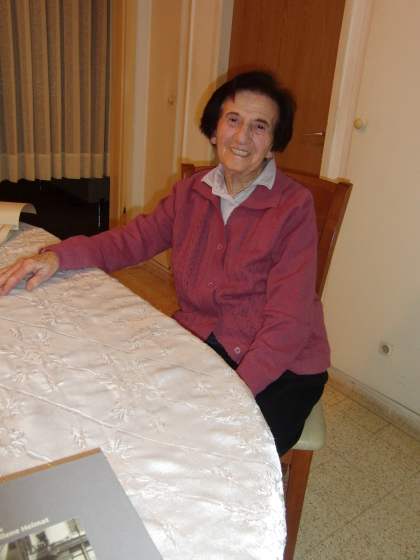 | To the other families |
Frank
Yael Pick – Sophie Frank
A visit to an ex-Heppenheimer at the Kibbutz HaMa’apil, Israel in January 2018

Yael Pick in her living room
It was a cold and very rainy January day when I started my journey from Jerusalem to the little Kibbutz HaMa’apil in the Mediterranean plain north of Tel Aviv to visit Yael Pick, whose original name was Sophie Frank and who comes from Heppenheim. Between downpours, flooded streets, followed by more sunshine, I arrived at the Kibbutz entrance and was told on the phone where to find the house. A short time later Yael Pick’s carer waved me to one of those typical basementless Kibbutz bungalows that I’ve known for years.
I was taken to an extremely bright and cheerful over-90-year-old woman who had obviously prepared herself for my visit. A few days previously I had phoned her from Jerusalem. I had been intrigued to see if Yael Pick would answer personally, and how she would react to my request to visit her. She very kindly invited me round and seemed delighted that someone from Heppenheim (if only a Heppenheimer for a few years) should show so much interest in her, and she immediately suggested a time.
So now I was with Yael Pick, who, as Sophie Frank, grew up together with her brother Hugo in the house of the doctor Fritz Frank and his wife Raissa until the age of 14. I know this house; it stands near Christ Church, where I was the vicar and is where I was once guest of the parents of a family whose child was being confirmed at this very house, and hence I knew exactly where we were talking about.
Yael Pick was in Heppenheim twice since the war and had met this family. “A nice young woman who asked me why I was looking at the house”. This woman proceeded to invite Yael Pick into the house and showed her the spot on the window sill where she had scratched her name as a child.
She had taken great care to prepare for my visit, not just with coffee and biscuits, but also with her father’s books, in which he wrote about his hometown, Horb on the River Neckar, and about his experiences in World War One. These books were lying ready and showed how much she still lives with her history, a history of loss and persecution. It was due to the perceptiveness of her mother, who saw through the events in the Third Reich, that the family managed to escape from National Socialist tyranny.
Her memories of Heppenheim were remarkably vivid. Rather roguishly she commented that a lady doesn’t invite a strange man into her bedroom … but she wanted to show me something. And so I got to see a small picture gallery in her bedroom. There were ones painted by her uncle, her mother’s brother. Besides a painting of a very beautiful woman (her mother) there were paintings of Heppenheim and its surroundings. Particularly beautiful was the one of her parents’ house, which is still standing today at the junction of Graf-von-Galen- and Karl-Marx-Strasse. We discussed for a short while if the long row of poplar trees was the Lorscher Strasse or the Hesse/Baden state border – but I think she was right with Lorscher Strasse. With each picture you could see how much these memories of Heppenheim have remained a significant part of her life right into old age.
I’m very grateful for my encounter with Yael Pick, who, despite all of the memories of the terrible crimes committed against her family and all other Jews in Germany and elsewhere, showed no bitterness towards me.
I’m aware of the evils caused to her family during the Holocaust. I know about the memories she has of the years of Nazi rule, of the victimization at school, of being excluded from social groups. I know that a part of her childhood and youth were stolen from her. That Yael Pick should still receive me with such cheerfulness and charm, with her energy and positive attitude to life – for that I’m very grateful to her.
But I also know that this encounter is a reminder of my obligation to call out racial hatred and antisemitism wherever I see it. How important such first-hand witnesses are in the current times when the ghost of racism is gaining ground and so many people think it necessary to try to re-write the history of our people.
—Ulrich Schwemer [Translated by Andrew Spencer]

